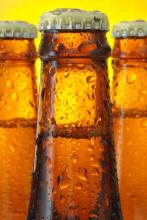User login
DENVER – During last year’s college football season, one in five fans tailgating on the campus of a large Midwestern university before games was intoxicated. But more than half of the tailgaters thought they were, according to a season-long Breathalyzer survey.
The highest average game-day blood alcohol concentrations among randomly sampled University of Toledo tailgaters occurred before the nationally televised opening game and again at the homecoming game (0.061 and 0.067 mL/L, respectively), Robert E. Braun reported at the annual meeting of the American Public Health Association.
The average blood alcohol level among tailgaters over the course of the season of parking-lot partying was 0.054 mL/L, but the fans significantly overestimated their levels, which they guessed were on average 0.072 mL/L.
In all, 20% of the tailgating fans – students, alumni, and partying visitors – were inebriated based upon a Breathalyzer reading of 0.08 mL/L or more, which is over the legal threshold for driving a motor vehicle. But 53% of the 466 tailgaters who took the Breathalyzer test and completed a 19-item questionnaire perceived themselves to be intoxicated. This suggests a need for social norm campaigns addressing game-day drinking, noted Mr. Braun of the university.
Results of this study underscore the point that alcohol abuse in conjunction with sporting events is a serious public health issue. University officials around the country need to design interventions to curb game-day drinking. One possibility would be to restrict pregame tailgating to, say, 3.5 hours to reduce excessive alcohol consumption, he argued.
Banning alcohol altogether on campus is seen as unrealistic at many universities. Of the surveyed tailgaters, 85% expressed support for designating selected tailgating locations on campus where alcohol consumption would be legal.
Mr. Braun declared having no financial conflicts regarding this university-funded study.
DENVER – During last year’s college football season, one in five fans tailgating on the campus of a large Midwestern university before games was intoxicated. But more than half of the tailgaters thought they were, according to a season-long Breathalyzer survey.
The highest average game-day blood alcohol concentrations among randomly sampled University of Toledo tailgaters occurred before the nationally televised opening game and again at the homecoming game (0.061 and 0.067 mL/L, respectively), Robert E. Braun reported at the annual meeting of the American Public Health Association.
The average blood alcohol level among tailgaters over the course of the season of parking-lot partying was 0.054 mL/L, but the fans significantly overestimated their levels, which they guessed were on average 0.072 mL/L.
In all, 20% of the tailgating fans – students, alumni, and partying visitors – were inebriated based upon a Breathalyzer reading of 0.08 mL/L or more, which is over the legal threshold for driving a motor vehicle. But 53% of the 466 tailgaters who took the Breathalyzer test and completed a 19-item questionnaire perceived themselves to be intoxicated. This suggests a need for social norm campaigns addressing game-day drinking, noted Mr. Braun of the university.
Results of this study underscore the point that alcohol abuse in conjunction with sporting events is a serious public health issue. University officials around the country need to design interventions to curb game-day drinking. One possibility would be to restrict pregame tailgating to, say, 3.5 hours to reduce excessive alcohol consumption, he argued.
Banning alcohol altogether on campus is seen as unrealistic at many universities. Of the surveyed tailgaters, 85% expressed support for designating selected tailgating locations on campus where alcohol consumption would be legal.
Mr. Braun declared having no financial conflicts regarding this university-funded study.
DENVER – During last year’s college football season, one in five fans tailgating on the campus of a large Midwestern university before games was intoxicated. But more than half of the tailgaters thought they were, according to a season-long Breathalyzer survey.
The highest average game-day blood alcohol concentrations among randomly sampled University of Toledo tailgaters occurred before the nationally televised opening game and again at the homecoming game (0.061 and 0.067 mL/L, respectively), Robert E. Braun reported at the annual meeting of the American Public Health Association.
The average blood alcohol level among tailgaters over the course of the season of parking-lot partying was 0.054 mL/L, but the fans significantly overestimated their levels, which they guessed were on average 0.072 mL/L.
In all, 20% of the tailgating fans – students, alumni, and partying visitors – were inebriated based upon a Breathalyzer reading of 0.08 mL/L or more, which is over the legal threshold for driving a motor vehicle. But 53% of the 466 tailgaters who took the Breathalyzer test and completed a 19-item questionnaire perceived themselves to be intoxicated. This suggests a need for social norm campaigns addressing game-day drinking, noted Mr. Braun of the university.
Results of this study underscore the point that alcohol abuse in conjunction with sporting events is a serious public health issue. University officials around the country need to design interventions to curb game-day drinking. One possibility would be to restrict pregame tailgating to, say, 3.5 hours to reduce excessive alcohol consumption, he argued.
Banning alcohol altogether on campus is seen as unrealistic at many universities. Of the surveyed tailgaters, 85% expressed support for designating selected tailgating locations on campus where alcohol consumption would be legal.
Mr. Braun declared having no financial conflicts regarding this university-funded study.
